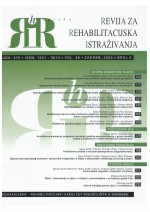Istraživanje stavova naše društvene zajednice prema zapošljavanju osoba s težom mentalnom retardacijom u redovitim uvjetima
Research into Attitudes in Our Community towards Employment of Severely Mentally Retarded People in Regular Environment
Author(s): Edita Šafranko, Jasmina Frey ŠkrinjarSubject(s): Labor relations, Health and medicine and law, Inclusive Education / Inclusion
Published by: Sveučilište u Zagrebu, Edukacijsko-rehabilitacijski fakultet
Keywords: persons with moderate and severe mental retardation; employment; laws; attitudes;
Summary/Abstract: The aim of this survey is to show attitudes present in the community towards employing severely mentally retarded people and the differences in these attitudes according to occupation and age group of participants, so as to identify ways to plan activities that would positively impact the process This survey was based on a sample of 400 participants, taken by the sample method among students of the University of Zagreb. The sample was divided into sub-samples based on the participant's age and profession. The questionnaire of attitudes towards employment of severely mentally handicapped persons, constructed for the purpose of this research was used as an instrument of measurement.The structure of attitudes was established by factor analysis. Dominant characteristics of specific blocks of variables, derived by factor analysis, were also expressed through discriminative analysis where we established statistically significant differences in the estimates of attitudes towards employing severely mentally handicapped persons. Four age groups of survey participants expressed significant statistically different attitudes towards employment of severely mentally retarded people in the regular working environment. Middle age participants had negative and the youngest participants had a more positive attitudes. A statistically significant difference was determined (by discriminative analysis) between the education of participants and their attitude towards the employment of persons with severe mental handicaps. As expected, more positive attitudes were expressed by students and people with higher education. The structure of the second and third discriminative factor with matching centroid suggest that participants with higher education, more than others are less prepared to have contact and job related relations with people who are moderately or severely retarded. People with special needs are unable to realize their basic human right to dignity, fulfillment and benefits within the society unless their basic needs are insured. The right to work is one of these basic needs. Results of the analysis show there is a need for change in attitude of the community towards severely mentally handicapped persons and towards their employment, as just one of the aspects of their inclusion into the environment. As a result of this research, the structure of attitudes toward employment of severely mentally retarded people are clearer and imply the need for a change through specific acts of proper interaction between the so called typical population and people with mental retardation who are a part of the society.
Journal: Hrvatska revija za rehabilitacijska istraživanja
- Issue Year: 38/2003
- Issue No: 2
- Page Range: 157-168
- Page Count: 12
- Language: Croatian

